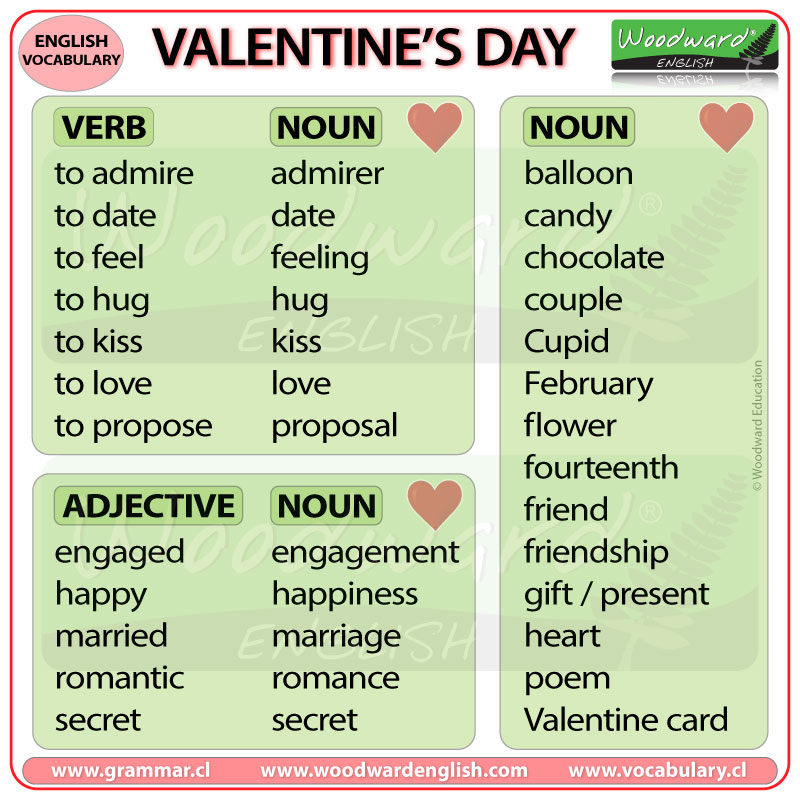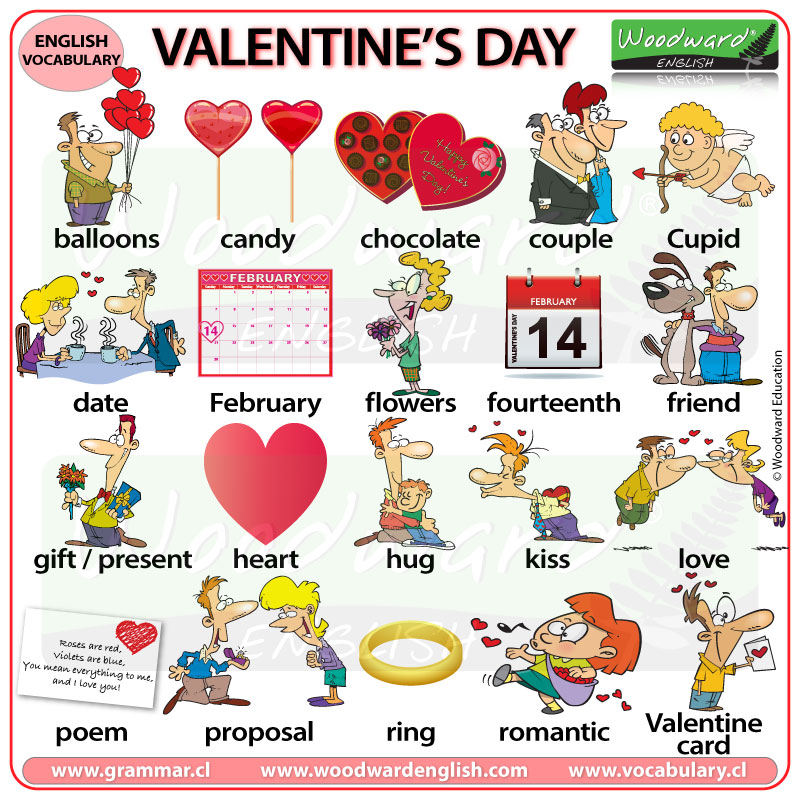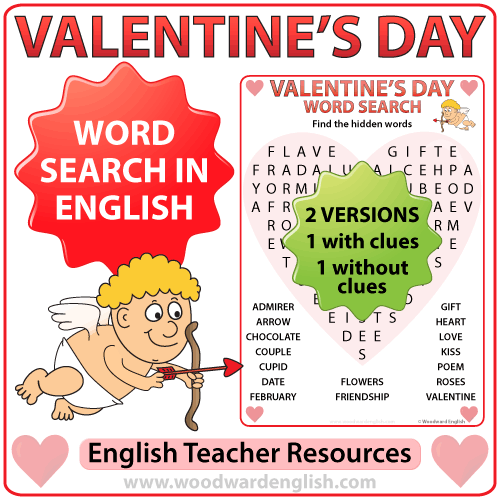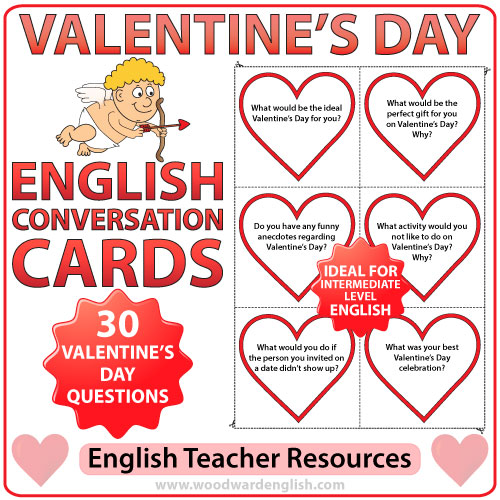Valentine’s Day Vocabulary | Valentine Verbs, Nouns, and Adjectives
Today we are going to learn about Verbs, Nouns, and Adjectives associated with Valentine’s Day.
VERB – NOUN
Many words in English have a verb form and a corresponding noun form.
Let’s look at some Valentine’s Day words that have a verb form and a noun form.
| VERB | NOUN |
| to admire | an admirer |
| to date | a date |
| to feel | a feeling |
| to hug | a hug |
| to kiss | a kiss |
| to love | love |
| to propose | a proposal |
You can see that sometimes the words are written the same way: Kiss is both a verb and a noun. But sometimes they are different such as feel being the verb and feeling the noun.
Let’s look at the meanings of these words with example sentences:
To admire – an admirer
admire (verb): to respect somebody’s qualities or what they have done.
- I admire your courage in these difficult times.
- He admired the way she handled the situation with grace.
admirer (noun): a person who has a romantic interest in someone.
- I think Janet have a secret admirer. (This means someone has a romantic interest in Janet)
- She had an admirer who would send her anonymous flowers every week.
To date – a date
date (verb): to have a romantic relationship with someone.
- Steve and Stephanie have been dating for several months.
- He didn’t want to date anyone seriously after his last relationship ended.
date (noun): 1. a romantic meeting 2. The person you go on a date with.
- He felt nervous asking her out on a date.
- Have you found a date for the prom?
To feel – a feeling
feel (verb): to experience an emotion or sensation (Its past tense form is irregular = felt).
- It feels like my heart has just broken.
- I feel so much better after talking to you about my problems.
feeling (noun): a person’s emotional state or reaction.
- Please don’t hurt my feelings.
- She couldn’t shake off the feeling that something special was about to happen.
To hug – a hug
hug (verb): to (affectionately) put your arms around someone tightly, especially to show your affection for that person.
- She hugged her son when he arrived home from school.
- After years apart, they ran to each other to hug tightly.
hug (noun): the act of holding someone in your arms, typically to express affection.
- She gave me a hug to try and make me feel better.
- A hug from a loved one can be incredibly comforting.
To kiss – a kiss
kiss (verb): to touch someone (or something) with your lips, usually as a sign of affection.
- The bride and groom kissed at the end of the wedding.
- They leaned in to kiss under the mistletoe at the party.
kiss (noun): a touch or caress with the lips.
- She gave her baby a kiss on the cheek.
- She blew him a kiss as she walked away.
To love – love
love (verb): to strong and constant feeling of affection for someone. It can also refer to a feeling of romantic attraction for someone.
- I will always love you.
- They learned to love each other’s quirks over time.
- He promised to love her no matter what challenges they faced.
love (noun): a strong, intense feeling of liking and caring for someone or something, especially a partner or member of the family.
- My love for you is like a star in the sky. You don’t always see it, but you know it’s always there.
- The love they shared was evident to anyone who saw them together.
Bonus Expression:
Love at first sight = to be attracted to someone the first time you see or meet them.
- When he saw her on the other side of the room, it was love at first sight.
To propose – a proposal
propose (verb): to ask someone to marry you.
- He got down on one knee and proposed to her.
- He was nervous about how to propose without making it too cliché.
proposal (noun): an act of formally asking someone to marry you.
- Even though you may have talked about getting married, the marriage proposal itself should be a surprise.
- His proposal was simple but heartfelt, in their favorite spot by the lake.
ADJECTIVE – NOUN
Now let’s look at some words that have an adjective form and a noun form.
| ADJECTIVE | NOUN |
| engaged | an engagement |
| happy | happiness |
| married | a marriage |
| romantic | romance |
| secret | a secret |
Here is the meaning of each word with example sentences:
engaged – engagement
engaged (adjective): have agreed to marry someone.
- After years of being a couple, they finally got engaged.
engagement (noun): a formal agreement to get married.
- The announcement of their engagement was not a surprise for their friends.
- The engagement lasted for one year before they tied the knot.
happy – happiness
happy (adjective): Feeling or showing pleasure or contentment.
- She was happy when she received the gift.
- I’m happy you could make it to the celebration today.
happiness (noun): The state of being happy.
- His happiness was evident from his wide smile.
- Happiness isn’t something you find; it’s something you create.
married – marriage
married (adjective): Officially in a committed, long-term personal relationship (often with legal implications)
- Rob and Ange have been married for over twenty years.
- They’ve been married for twenty-five years and still enjoy each other’s company.
marriage (noun): The formal union of two people as spouses (husband or wife).
- The secret to a long-lasting marriage is mutual respect and understanding.
- Their marriage is going through a rough patch right now.
romantic – romance
romantic (adjective): Showing or expressing feelings of love or affection towards someone.
- Their romantic getaway was filled with candlelit dinners and long walks on the beach.
- He’s known for his romantic gestures, like leaving love notes for her to find.
romance (noun): A feeling of excitement and mystery associated with love.
- Their romance started at a coffee shop.
- She is looking for more romance in her life.
secret – secret
secret (adjective): Not known or not meant to be known or seen by others.
- They had a secret meeting in the park.
- She gave me a secret smile that meant only good things.
secret (noun): Something kept unknown or unseen by others.
- She shared her secret with me and told me not to tell anyone else.
- Keeping a secret can be as hard as revealing one sometimes.
Valentine’s Day Verbs Nouns Adjectives – ESOL Chart

MORE VALENTINE’S DAY NOUNS
Some other nouns associated with Valentine’s Day include:
Balloon (noun): A lightweight, typically spherical rubber sac filled with air or gas, used for decoration.
- She bought a heart-shaped balloon for her boyfriend.
Candy (noun): A broad term for sweets, including hard candies, gummies, lollipops, and other sugar-based treats.
- He shared his candy with his partner.
Chocolate (noun): A sweet food made from cacao beans, typically in the form of a bar.
- He gave her a box of chocolates for Valentine’s Day.
Couple (noun): Two people who are married, engaged, or in a romantic relationship.
- The couple walked hand in hand along the beach.
Cupid (noun): In Roman mythology, the god of love, often depicted as a winged boy with a bow and arrows who makes people fall in love.
- The statue in the garden was of Cupid with his bow.
February (noun): The second month of the year, which has 28 days, or 29 in a leap year.
- Valentine’s Day is in February.
Flowers (noun): Plants with colorful petals and often a pleasant smell.
- He gave her a bouquet of flowers for their anniversary.
Fourteenth (noun): The number or day that comes after the thirteenth and before the fifteenth.
- Valentine’s Day is on the fourteenth of February.
Friend (noun): Someone you know well and like, but who is not a member of your family.
- My best friend and I share everything with each other.
Friendship (noun): The state of being friends; the relationship between friends.
- Their friendship began over a shared love of music.
Gift / Present (noun): Something given to someone without expectation of payment; often given on special occasions.
- He wrapped the gift beautifully with a bow on top.
Heart (noun): The organ in your chest that pumps blood, or the center of one’s emotions or character.
- He spoke from the heart, expressing his true feelings
Poem (noun):
A piece of writing that uses imaginative or creative language in short lines, often with rhyme or rhythm, to convey meaning or evoke feelings.
- I found a beautiful love poem in an old book.
Valentine Card (noun): A card, often with romantic or affectionate messages, given on or around Valentine’s Day.
He made his own Valentine card to give to his girlfriend.
Valentine’s Day Vocabulary – ESOL Chart & Video
You can hear the pronunciation of these Valentine’s Day words in the video.

Next Activity
Try our funny Valentine’s Day English Vocabulary Quiz (on our vocabulary.cl website)


